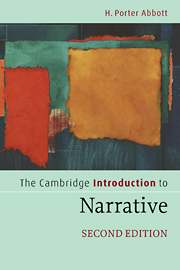Book contents
- Frontmatter
- Contents
- List of illustrations
- Preface
- Preface to the second edition
- Acknowledgments
- Chapter 1 Narrative and life
- Chapter 2 Defining narrative
- Chapter 3 The borders of narrative
- Chapter 4 The rhetoric of narrative
- Chapter 5 Closure
- Chapter 6 Narration
- Chapter 7 Interpreting narrative
- Chapter 8 Three ways to interpret narrative
- Chapter 9 Adaptation across media
- Chapter 10 Character and self in narrative
- Chapter 11 Narrative and truth
- Chapter 12 Narrative worlds
- Chapter 13 Narrative contestation
- Chapter 14 Narrative negotiation
- Notes
- Bibliography
- Glossary and topical index
- Index of authors and narratives
Chapter 9 - Adaptation across media
- Frontmatter
- Contents
- List of illustrations
- Preface
- Preface to the second edition
- Acknowledgments
- Chapter 1 Narrative and life
- Chapter 2 Defining narrative
- Chapter 3 The borders of narrative
- Chapter 4 The rhetoric of narrative
- Chapter 5 Closure
- Chapter 6 Narration
- Chapter 7 Interpreting narrative
- Chapter 8 Three ways to interpret narrative
- Chapter 9 Adaptation across media
- Chapter 10 Character and self in narrative
- Chapter 11 Narrative and truth
- Chapter 12 Narrative worlds
- Chapter 13 Narrative contestation
- Chapter 14 Narrative negotiation
- Notes
- Bibliography
- Glossary and topical index
- Index of authors and narratives
Summary
Adaptation as creative destruction
If the creative leeway between script and performance is wide in the production of plays, it is enormous when adaptation crosses media boundaries. This is necessarily the case. Reviewers who complain that a film or play is a poor “translation” of the original may miss the fact that adaptation across media is not translation in anything but the loosest sense. In fact, it can sometimes be the attempt to make a strict translation that winds up in failure. George Bluestone formulated the strong “destructivist” position on this issue fifty years ago:
What happens … when the filmist undertakes the adaptation of a novel … is that he does not convert the novel at all. What he adapts is a kind of paraphrase of the novel – the novel viewed as raw material…. It has always been easy to recognize how a poor film “destroys” a superior novel. What has not been sufficiently recognized is that such destruction is inevitable. In the fullest sense of the word, the filmist becomes not a translator for an established author, but a new author in his own right.
This holds for plays as well as movies. In the words of a still earlier critic and director, Béla Balázs, “Shakespeare, reading a story by Bandello, saw in it not the artistic form of a masterpiece of story-telling but merely the naked event narrated in it” (Bluestone, 63).
- Type
- Chapter
- Information
- The Cambridge Introduction to Narrative , pp. 112 - 129Publisher: Cambridge University PressPrint publication year: 2008



